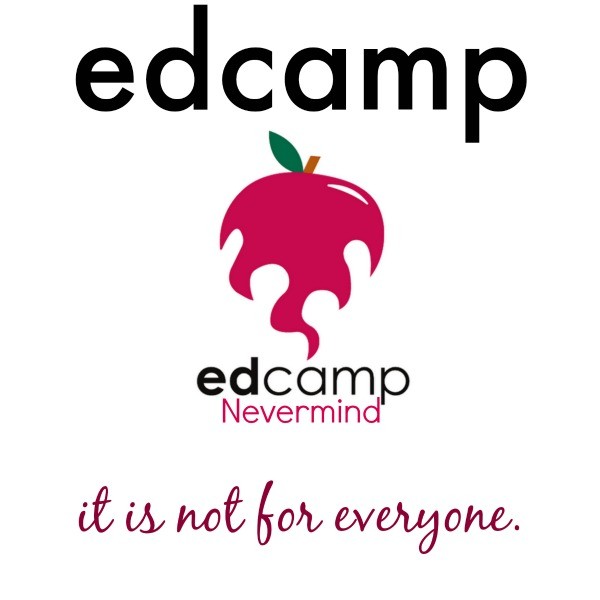I assisted a group of local leaders explore an Edcamp option earlier in the week for a leadership meeting. This group consisted of people leading schools through real challenges and I respect them for their experience and results. It was fascinating to watch them work through the obvious uncertainty that an Edcamp brings with it.
They were worried topics they “needed” addressed would not be covered.
They were concerned that an Edcamp would deliver on “fun,” but not learning.
Networking and connections could percolate in this informal setting however.
They really struggled with how to ensure they provided an event to meet the minimum needed experience. And EdCamp isn’t that; you do not ordinarily get up early on a Saturday to travel to a minimal collection of what you have to know. You go to something “scary awesome” (where did I read that lately? I’d love to give credit!) to learn about inspirational things which you did not know you wanted to learn.
As leaders do, they identified the motivations, the goals, the possible outcomes. They talked through their concerns and wondered if there couldn’t be a compromise to use EdCamp, but still also assure some minimal exposures to common content? They settled upon a hybrid experience where the last half of the day would start with some vetted Ignite sessions and then transition to a short EdCamp experience. I volunteered that my motivation behind leaders experiencing an EdCamp was so that they understood the value of it and what it was like to learn that way. I asked they reserve the EdCamp name for an actual EdCamp experience. (That way leaders would not ‘think’ they knew what an EdCamp was and make mistakes from there – maybe not encouraging their teachers to attend, maybe turning teachers off from a potential career-altering experience in their future because they confused it with sit and get professional learning sessions.)
These leaders liked EdCamp for the networking opportunities, these leaders had low confidence in the content learned was what they wanted other leaders to gain, and they did not seem confident that those in attendance would offer enough participation for a leadership edcamp to be successful.
While reflecting on this experience, at the end of that same week I learn that the EdCamp experience my work group provided to elementary teachers in our district is going to be replicated during preplanning I was further perplexed. Was it the function of current school leadership to guide more directly and teachers to explore more laterally? Was this a symptom of educational hierarchy self-preservation? Was it simply an unavoidable function of certain job roles? I do not know. However I note that those closer to classroom teaching seem to see the value of an EdCamp style experience over those in supervisory positions in my experience. I still do not know how I feel about this. I do not know if it is an isolated or pervasive point of view of EdCamps by administrators. I just don’t know.
I do know that I have learned much from my EdCamp experiences which also include a guest post on #EdCampSav. You can read about that time my work group put on an in-district EdCamp for elementary teachers, both professional review and personal review. I do know that I will continue to attend EdCamps when possible, because for me, they are “scary awesome” professional learning!






2015-06-07 at 9:32 am
Great post, Penny! We are addressing this by providing PD that honors the tenets of unconferencing but providing enough facilitation structure to allow everyone to feel safe and supported. EdCamp by degrees! 🙂
2015-06-07 at 9:45 am
How interesting. I’d love to learn more about your approach – have a post you could share?
2015-06-07 at 11:09 am
Thanks for this post. I’ve heard so many people struggling with these issues. I think it really comes down to ownership for learning. Are we comfortable letting people drive their own learning? The messiness can be scary. I’d argue it’s worth it!
2015-06-07 at 12:34 pm
Thanks Kristen, I find myself in agreement with you. I wonder what the “secret sauce” is that pushes some to try it and others to reject it?
2015-06-08 at 2:33 am
Interesting post. I think you’re right that not everyone sees the point of an EdCamp model right away — and certainly prior to experiencing it themselves. And there may be a different perspective (and perhaps a lack of trust or value in autonomy and choice). But I’d also posit that part of the success of the EdCamp model is the self-selection of the participants – it’s voluntary not just once there, but being there in the first place. I wonder how much can translate to a mandatory situation.
2015-06-24 at 9:00 am
SR – the voluntary/compulsory thought has a hold of me. Check out my posts about in-district EdCamp under my MOOC tag: https://www.hotlunchtray.com/tag/edcamp/ . It sounds like that might be what I am struggling with indeed.
2015-06-23 at 7:30 am
I’ve attended/participated EdCamp Houston every year for 3 years now, and I second your motion. They absolutely fantastic!
2015-06-24 at 9:00 am
I’m with you friend! 🙂
2015-06-23 at 9:25 am
Given the pen ended opportunity not everyone will choose to learn. Some well constructed constraints will not only help people learn deeper, but sometimes it will teach them to learn.
For further thoughts I would watch the webinar on a flurry of cursors by Jesse Stommel https://etmooc.org/archive/
I would also look at some resources on rhizomatic learning I have shared here. https://www.philosophywithoutahome.com/blog/2013/02/04/reflections-etmooc-week-2-and-rhizomatic-learning/
Follow Dave Cormier for more, I’m sure he will host another MOOC on the subject soon.
Also
2015-06-24 at 8:57 am
Brendan,
Thanks for the smart feedback, but an even bigger thank you for the MOOC suggestion. It looks awesome!
If you like a good MOOC check out my MOOC tag at this blog and you can see which ones I’ve taken and loved as well.